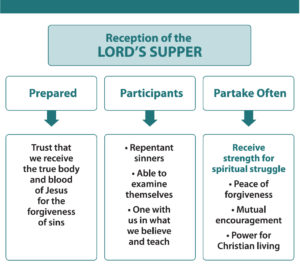 |
Why can’t my sister have communion with us?
Gary A. Pufahl
How do I answer that question “Why can’t my sister have communion with us?” without knowing either the person who is asking or the person being asked about? As Christians, we care about both people and want what is best for them. But first we have to know your sister’s situation and whether she understands the Lord’s Supper, the grace of God, and the teachings of the Bible.
Achieving fellowship
Here are some things to consider:
God’s goal: Fellowship. Ever since God created this world and its people, he has only one goal in mind: He wants us to be in perfect fellowship with him. He wants us to enjoy his presence. But in order to have fellowship with a holy and perfect God, we can only approach God on his terms and in his way.
Mankind’s problem: Sin. The sad reality is that, due to our sinful nature, human beings don’t like God’s terms. Instead of submitting to what God says, our sinful nature wants to be superior to what God says—to do things our own way. I have a sinful nature that abhors God’s will and his Word. So do you, and so does your sister.
God’s solution: Repentance. But what a heart God has! He is love. He wants what is best for us. He goes into action to do what is best for us. God the Holy Spirit works repentance in our hearts and minds. He brings us to a genuine sorrow over our rebellion and defiance. He gives us a new heart and a new mind that see what he did to make us new.
Fellowship achieved. What do we see? We see a man who is God stooping down to wash his disciples’ feet (John 13:14). We see a Lord who came to be a servant (Matthew 20:28). We see the Holy One who became sin (2 Corinthians 5:21). Jesus stood between God and sinful humanity. He chose to be made guilty of the sins of all. He became the atoning sacrifice for me, for you, and for your sister. He achieved what we could not achieve. Jesus has made us right with God: sin removed; righteousness given. We have fellowship with God through our Savior, Jesus Christ.
God’s gift: His Supper. The very night before he went to the cross to achieve that for us, Jesus gave his disciples—and us—something to treasure until he returns in glory on the Last Day. He gave us a gift that we as the church are to celebrate until he brings us to the banquet feast of heaven.
There he is, speaking so very clearly. He was just hours from dying and wanted his disciples to know in no uncertain terms. Holding the bread, he said, “Take and eat, this is my body, which is given for you. Do this in remembrance of me.” Then he took the cup and said, “Take and drink, this is my blood of the new covenant, poured for you for the forgiveness of sins” (cf. Matthew 26:26-28).
He gives us forgiveness. Fellowship is achieved. As I approach this table, I carry a load of sin: a bag full of my pride, defiance, greed, and idolatrous ways. It weighs me down. But at the table of my Lord Jesus, I receive something completely different. My Lord bends down to earth in the bread and wine and Word. He looks me in my eyes of faith and says, “This is for you. You are forgiven.” I walk away from that table, and the burden is gone. Jesus has taken that weighty bag and has given me joy of heart. I have peace with God. Fellowship is achieved through Jesus.
Expressing fellowship
But God never intended that fellowship would just be a personal blessing between him and me. He intended that an individual would express faith jointly with others. We come together to worship. God has always intended individuals to express their faith jointly in the community of other believers.
The Lord’s Supper is just such a public expression. The apostle Paul teaches that as we join in the Lord’s Supper, we publicly and jointly proclaim the Lord’s death until he returns (1 Corinthians 11:26). In a very real way, I am joining together with other people to confess my Lord when I take Holy Communion. We are united. We are one. A fellowship or unity is expressed.
What is unity except that we believe and confess the same truths! Not my truths, not your truths, but Christ’s truths—all of them. Let’s start with the truth of the Lord’s Supper. Do I believe that I am a sinner in need of Jesus alone (Luke 18:13)? Do I recognize that Jesus gives me his very body and blood miraculously connected to the bread and wine (1 Corinthians 10:16)? Do I believe that Jesus fully and freely lifts the burdens of sin and guilt off of my account and supplants them on his account (2 Corinthians 5:21)? Do I believe that I have the privilege of proclaiming the Lord’s death with these fellow Christians in the Lord’s Supper until Jesus returns on the Last Day (1 Corinthians 11:26)?
But true unity is tied to all we believe. Do we believe and confess all the truths of Scripture? Together we submit to God’s Word. Together we place ourselves beneath God’s will. Together we let the Word of God teach us and mold us. The Lord’s Supper is our avenue through which we express fellowship with God and with each other.
Showing love
I care deeply about your sister. I desire only what is best for her. Without knowing exactly where she is at as an individual Christian, it’s difficult to answer why she can’t take communion with us, or even why she shouldn’t. Certainly, I would never want to put her in a situation that would bring her harm. If someone does not believe what Jesus teaches about the Lord’s Supper, that person would take it to her harm, not her healing (1 Corinthians 11:29). Since the Lord’s Supper is an expression of fellowship and unity (1 Corinthians 10:17), I also wouldn’t want to put your sister in a situation where she gives public profession of unity with us if she doesn’t believe and confess the same as we do.
But the goals are still the same: fellowship and unity. I would love to have and express fellowship with your sister. We all would. I would pray that together we would have the opportunity to sit at the feet of Jesus and let him do what only he can do: create fellowship with God and each other through his teaching.

Text for illustration: From Luther’s Catechism © 2017 Northwestern Publishing House.
All Christians should examine themselves before receiving the Lord’s Supper. Resources are available to prepare yourself for Holy Communion in Christian Worship (p. 156) and Luther’s Catechism (2017) (pp. 371-373).
Author: Gary A. Pufahl
Volume 107, Number 04
Issue: April 2020
- Please explain: Why is the physical resurrection of Jesus Christ from the dead so important?
- Please explain: Why did God give the Ten Commandments?
- Please explain: Why does the Bible call Satan “the god of this age”?
- Please explain: What sets Old Testament Israel apart from other people?
- Please explain: Why is the virgin birth of Christ important?
- Please explain: Am I really a saint?
- Please explain: What does it mean that “many are invited, but few are chosen”?
- Please explain: How is church discipline a loving practice of the church?
- Please explain: Can a Bible verse be overused or used at an inappropriate time or setting?
- Please explain: What can I do when my relationship with Jesus causes family problems?
- Please explain: What good can possibly come from the persecution of Christians?
- Please explain: What is the Holy Spirit’s role in the life of a Christian?
- Please explain: What does it mean that Jesus’ enemies would become a footstool for his feet?
- Please explain: What do people mean when they say that they have been “born again”?
- Please explain: What does it mean that Christians are priests before God?
- Please explain: If I have been baptized, does that mean I have been anointed?
- Please explain: Can Christians be so heavenly minded that they are of no earthly good?
- Please explain: The world is a mess. Why doesn’t Jesus do something about it?
- Please explain: Why is Holy Communion so important to confessional Lutherans?
- Please explain: What does it mean to give up everything to follow Jesus?
- Please explain: If I worry, am I doubting God?
- Please explain: What is the point of praying?
- Please explain: Where do we get the idea of the Trinity when that word isn’t mentioned in the Bible?
- Please explain: If Jesus is the Good Shepherd, how can he also be the Lamb of God?
- Please explain: What’s the big deal about Easter?
- Please explain: Why should we love our enemies?
- Please explain: Why did Jesus do miracles?
- Please explain: As a Christian, what does it mean to be humble?
- Please explain: What does it mean to have your name written in God’s book?
- Please explain: Is God’s design for marriage relevant in today’s world?
- Please explain: Does God favor certain people?
- Please explain: Why do I so often fail to do what God wants?
- Please explain: Why is the church always talking about money?
- Please explain: How does God’s kingdom grow?
- Please explain: Why are only Christians’ works good, but the same works by others are not?
- Please explain: How do we know that Jesus rose from the dead?
- Please explain: If the Sabbath law no longer applies, why do I have to go to church?
- Please explain: Why did God cruelly command Abraham to sacrifice his son?
- Please explain: Does Christian freedom give me the right to do anything?
- Please explain: Is heaven going to be boring?
- Please explain: Why is Jesus taking so long to return?
- Please explain: Why did Jesus use parables to teach?
- Please explain: Does Jesus build his church on Peter and his successors?
- Please explain: How can I be a Christian when there are so many hypocrites in the church?
- Please explain: Why should I be a Christian when I have to suffer?
- Please explain: How do I know whom to believe now that Jesus is gone?
- Please explain: How can Jesus be our friend if he isn’t physically here on earth?
- Please explain: Why can’t my sister have communion with us?
- Please explain: Whom do we blame for bad things?
- Please explain: Are sins of thought as bad as committing the actual sin?
- Please explain: What makes God unique?







